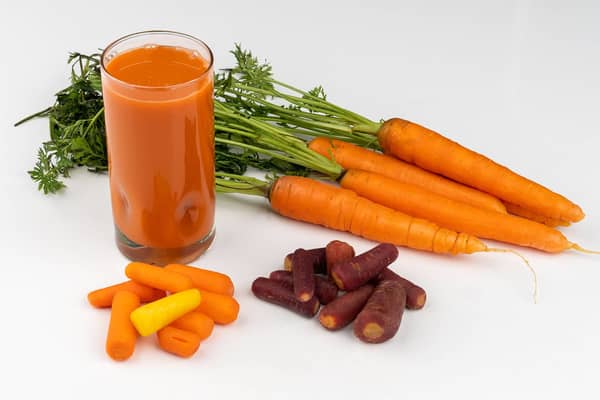5 Health Benefits of Garlic, According To Registered Dietitians
Nutrition
This flavorful food is packed with potential therapeutic properties.

From helping reduce the risk of cancer to promoting heart health and longevity, scientific evidence has shown that garlic can be an important food to keep in regular rotation. Garlic has been used for centuries by cultures around the globe for its medicinal properties, according to the National Institutes of Health — and for good reason.
“Though garlic is not a magic bullet, research suggests that as part of a balanced eating plan, garlic offers several health benefits,” said Elizabeth Ward, M.S., R.D.
Many studies on garlic were performed on supplements and extracts, but “eating good old regular garlic also has powerful benefits,” said Dawn Jackson Blatner, R.D.N.
Check out these top health benefits that can come from adding a little garlic to your daily diet.
(Related: 4 Unexpected Health Benefits of Pumpkins, Say Dietitians)
5 Potential Health Benefits of Garlic
1.Supports Immune Function
Including a little bit of garlic into your meal plan most days of the week can be beneficial to the immune system, research has suggested.
“One study found that eating just one meal containing about one to two cloves of raw garlic activated immune cells,” Blatner said.
The study, published in a 2015 issue of The Journal of Nutrition, consisted of a randomized controlled trial that examined the blood cells of people who consumed one serving of bread topped with butter and 5 grams of raw, crushed garlic. Prior to eating the garlic bread, participants were instructed to take a 10-day hiatus from garlic.
After participants ate their garlicky snack, the genes related to immunity, apoptosis, (how the body gets rid of abnormal cells) and xenobiotic metabolism (how the body processes foreign substances), were activated. For the control group in the study who did not receive garlic bread, the same genes did not activate.
2.Promotes Heart Health
Research and experts have suggested that there are a number of potential cardiovascular benefits associated with eating garlic.
“When it comes to heart disease, a steady intake of garlic can help lower your risk by reducing the amount of both total cholesterol and LDL — low-density lipoprotein — cholesterol, which contributes to clogged arteries that blocks the flow of blood to your heart,” Ward said.
A 2018 meta-analysis revealed that garlic has “antihyperlipidemic ability,” meaning it can help reduce lipids or fat particles in the blood.
“Garlic does all this without reducing HDL (high-density lipoprotein) cholesterol, the type of cholesterol that protects against heart disease,” Ward said.
Another study, found in a 2018 issue of The Journal of Dietary Supplements, instructed participants to eat 100 milligrams per kilogram of their body weight of garlic twice per day. It concluded that, “consuming raw, crushed garlic regularly over four weeks can decrease waist circumference, improve blood pressure, lower triglycerides, improve fasting blood sugar, and increase good cholesterol,” Blatner said.
3.Reduces Inflammation
Garlic has also been linked to reducing inflammation in the body, helping alleviate chronic pain.
Take, for example, a study from a 2020 issue of the journal Phytotherapy Research, which involved 70 women who had been diagnosed with rheumatoid arthritis.
One group was instructed to take 1,000 milligrams of a garlic supplement daily for eight weeks, while others took a placebo. Compared to the control group, the study participants reported a significant decrease in pain intensity, tender and swollen joints, and fatigue.
“Lowering inflammation in the joints can help reduce chronic pain, and preliminary research suggests garlic may be beneficial for those with rheumatoid arthritis,” said Ward.
And since garlic contains anti-inflammatory properties, Ward said that it may further contribute to reducing the risk of certain cardiovascular diseases.
4.Lowers the Risk of Certain Cancers
Not only is garlic beneficial for heart health and reduced inflammation in the body, several studies have also linked garlic intake to a reduced risk of cancer.
A study published in a 2019 issue of Asia-Pacific Journal of Clinical Oncology found the consumption of allium vegetables — which includes garlic — was associated with a reduced risk of colorectal cancer.
Other studies propose garlic can stave off more than just colorectal cancer. For example, a review published in a 2020 issue of Antioxidants identified a link between garlic intake and the reduction of prostate, esophageal, larynx, oral, ovary and renal cell cancers as well. The highest health benefits were tied to raw garlic, especially after it was chopped or crushed.
What’s more, garlic has been shown to lessen the effects of stomach cancer in those who have it. In fact, research found in a 2019 issue of The BMJ revealed that patients who took garlic supplements for seven years along with a two-week medical treatment had a “statistically significant” reduced risk of death due to gastric cancer lasting more than 22 years.
5.Increases Longevity
The key to tacking on a few extra years may be to sprinkle a bit of garlic on your plate.
According to a study published in a 2019 issue of Nutrients, which included more than 27,400 senior volunteers with an average age of 92, regular consumption of raw garlic was associated with a longer life.
In fact, the adults who consumed garlic more than five times a week had an 11 percent reduced risk of all-cause mortality compared to participants who ate garlic less than once a week.
What’s the Best Way To Eat Garlic To Reap Its Benefits?

Ward and Blatner both emphasized that uncooked garlic best retains its nutritional properties.
“Raw garlic that has been well-minced or crushed and left to sit for a few minutes is the version with the most antioxidants,” Blatner said. “This is because crushing raw garlic activates many of the healthy plant compounds such as allicin, and cooking decreases those compounds.”
Ward recommended not frying garlic. “Instead, add garlic to dishes at the end of cooking to get the most benefit,” she said.
A little bit of garlic can add lots of flavor to everyday snacks and meals. Both registered dietitians recommended adding garlic to pastas, soups, stews, salad dressings, stir-fry recipes, and dips such as pesto, salsa and hummus.
“And, yes, raw garlic can go into smoothies,” Blatner said. “The pro tip is to make sure you add ingredients that help offset the strong flavor of garlic.”
Blatner suggested adding something sour like lemon, flavorful like ginger or mint, or sweet like pineapple to blanket the flavor.
(Related: 8 Low-carb Vegetables to Add to Your Grocery List)
What’s the Best Way To Store Garlic?

For starters, don’t keep garlic in the refrigerator.
“It doesn't like humidity, either, because it will hasten sprouting,” Ward said.
Storing it whole — as garlic heads or cloves — in a dark, moisture-free location will extend its shelf life.
Blatner suggested using a ceramic garlic keeper, which shuts out light while allowing the garlic to breathe, thanks to holes on the sides.
Words by Amy Capetta





